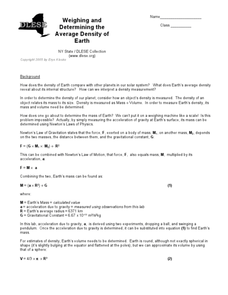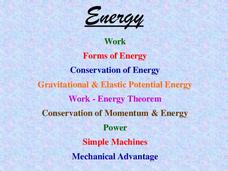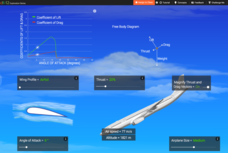Curated OER
Motion
In this motion worksheet, students use a position vs. time graph to determine the distance traveled and the velocity at with the object traveled. This worksheet has 2 problems to solve.
Curated OER
The Science of Weather: Hurricanes
Students use this USA today activity to learn about hurricane season. In this hurricane lesson, students study the map of the earth and hurricane science. Students complete discuss questions. Students draw a map of the United States and...
Curated OER
Pop Rocket - Trash to Treasure
First off, Newton's laws of motion aren't often taught at 2nd grade, so this lesson may be more appropriate for upper elementary learners. It begins with a discussion and demonstration of the laws of motion, and then has individuals...
New Mexico State University
Lab 6: Kepler's Laws
A 15-page package thoroughly teaches your physics or astronomy learners about Kepler's three laws of planetary motion. Each one is stated and explained. Class members answer questions, solve problems, and participate in the classic...
Curated OER
Roller Coasters
Twisting and turning through the sky, roller coasters are popular attractions at amusement parks around the world, but how exactly do they work? Explore the physics behind these thrilling rides with an engineering design activity....
CK-12 Foundation
Water Fountain
Most water fountains are designed to keep the water inside the fountain, but how are they designed to shoot up and out without the water leaving the fountain? Scholars vary the launch angle, fountain height, launch speed, and catcher...
Curated OER
Unit VI: Worksheet 2 - Force, Velocity, Displacement
Future physics majors look at a diagram of a marble rolling across a railing. They sketch motion maps and force diagrams. They determine the horizontal range of the marble as it falls to the floor. Then they double the height and repeat...
Physics Classroom
Action-Reaction Lab
Computer-interfaced motion detectors are required to carry out this inquiry. It is a new twist on exploring motion with plunger carts: they are set back-to-back and then propelled away from each other. Their velocities are measured, and...
Curated OER
Newton's Hat Trick
Students are challenged to develop skits illustrating each of Newton's three laws of motion. They are asked to identify examples of Newton's laws in sports. Students are asked how does Newton's third law allow a runner to run?
Curated OER
Vectors
Represent motion with arrows and call them vectors! The lesson is a presentation that models the mathematics involved when determining a resultant vector. It addrssses motions that are parallel, perpendicular, and a combination of both.
CK-12 Foundation
Hot Air Balloon
How can people control a hot air balloon? The simple simulation allows scholars to adjust the payload mass, burner, and vent position on a hot air balloon and observe the changes in velocity and altitude over time. Challenge questions...
CK-12 Foundation
Everglades Airboat
How does an airboat move when there isn't a motor in the water? The simulation teaches the forces related to the thrust and drag on an airboat. Scholars vary the boat mass and thrust force in order to view graphs of the changing force...
CK-12 Foundation
Elevator
Do you weigh slightly less when an elevator first starts its descent? The simulation teaches the change in the force based on the acceleration, constant speed, or deceleration of an elevator. Scholars control the mass and acceleration...
CK-12 Foundation
Stow Lake
Does the depth of a pond matter to the waves created when rain is falling? Many people assume the answer is no, but interestingly, it does matter. Pupils explore this concept and other variables related to wave behavior through a...
Curated OER
Weighing and Determining the Average Density of the Earth
Some background information about density and Newton's Laws of gravitation and motion assist pupils in the following experiment. The procedure will help them further their understanding of gravity, pendulums, and a drop-ball experiment....
Urbana School District
Energy, Work, Simple Machines
The tension of the 236 strings in a grand piano exert a combined force of 20 tons on the cast iron frame. The presentation includes topics such as work, forms of energy, conservation of energy, gravitational and elastic potential energy,...
CPO Science
Potential and Kinetic Energy
Here's a resource ideal for independent learners who need extra reinforcement or would like to work ahead. These textbook chapters and practice problems cover many basic physics concepts, starting with potential and kinetic energy and...
It's About Time
The Doppler Effect
In 1842, Christian Doppler proposed a theory relating the change of wavelengths based on motion. Young scholars observe the Doppler Effect on a small scale in a ball, on a larger scale from a car, and on the largest scale studying the...
CK-12 Foundation
Bow and Arrow
Where does the energy of an arrow come from? Is it from the person, the bow, or somewhere else? A simulation allows scholars to adjust the stretch distance and the elastic constant in order to understand where the energy comes from, what...
CK-12 Foundation
Airplane
How does an airplane control its take off and descent? Scholars explore the forces acting on an airplane and control the angle of attack, wing profile, thrust, and airplane size. They learn about lift, drag, thrust, gravity, and the...
CK-12 Foundation
Pirate Ship
Everything that happens is an interaction, from the wind blowing a sail to a cannon ball being thrust out of a cannon. A simulation shows the interactions involving a sail, air, ball, pirate, cannon, deck, ocean, and the Earth and the...
CK-12 Foundation
Horse and Cart
Can a horse pull more than its weight? A simple simulation answers this question and more. Pupils adjust the mass in a cart, the mass of the horse, the acceleration of the horse, and the angle of the tension rope between the horse and...
CK-12 Foundation
Phases of the Moon
The sun can tell us what time it is with a sun dial, but can the moon do the same? Scholars play with a simulation of the phases of the moon. They control the type of moon and time of day in order to see when the sun is up and when the...
CK-12 Foundation
Bowling Alley
Sometimes it appears that a bowling ball slides down the alley rather than rolling, while other times it appears to switch rolling directions at some point. Scholars control the bowling ball size, initial rotation, initial speed, and...

























